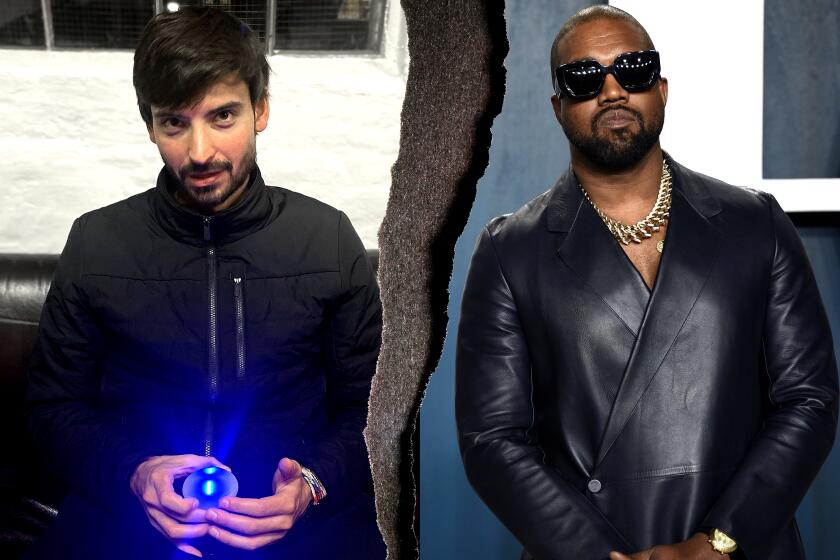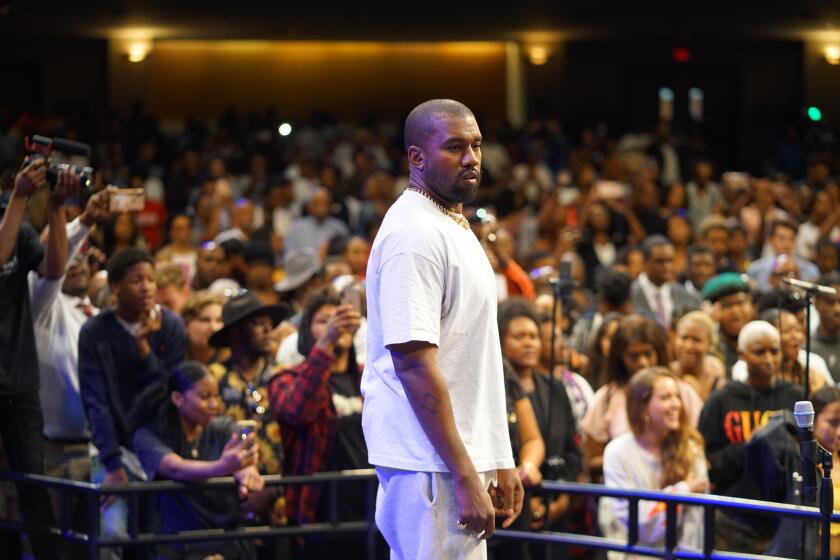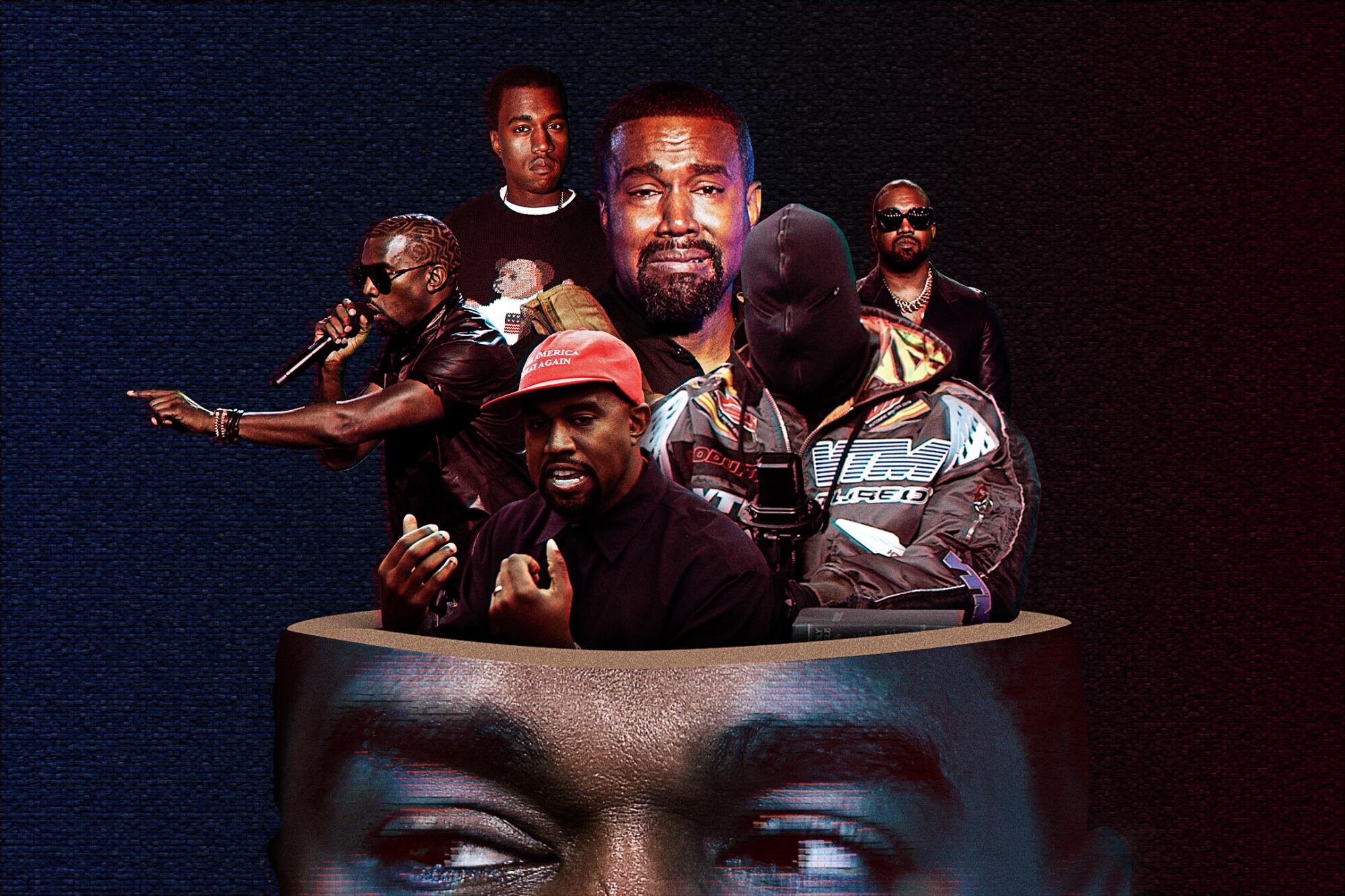
- Share via
In late November, Kanye West, the 45-year-old rapper now known as Ye, dined at Mar-a-Lago with former President Trump and a neofascist.
Trump sat with West and his guest Nick Fuentes, a far-right influencer and white supremacist who attended the deadly 2017 “Unite the Right” rally in Charlottesville, Va. Fuentes doubts the Holocaust’s existence, and has said progressive shifts in society are a “bastardized Jewish subversion of the American creed. The founders never intended for America to be a refugee camp for nonwhite people.”
Not long ago, West was surrounded by cultural luminaries like his ex-wife Kim Kardashian, his lifelong collaborator Jay-Z and Balenciaga’s creative director, Demna. His dinner companions were top executives from Adidas and Gap, eager to chat about their nine-figure partnerships.
After decades at the vanguard of music and fashion, West has descended into the far-right fever swamps, following months of antisemitic, Christian nationalist ravings on social media and podcasts. In the past, fans and peers showed some empathy for West’s erratic rants, given his struggles with bipolar disorder, as well as the latitude for “free thinking” often afforded wealthy creatives. But even his closest friends and associates have jumped ship after he made dangerous and hate-filled statements like “I’m going death con 3 On JEWISH PEOPLE” and described abortion to Tucker Carlson as “genocide and population control ... that is promoted by the music and the media that Black people make, that Jewish record labels get paid off of.”
This week, West praised Adolf Hitler in an interview with conspiracy theorist Alex Jones.
On Friday, President Biden, without mentioning West by name, took to Twitter to remind his 28 million followers that “The Holocaust happened” and “Hitler was a demonic figure.”
West has lost his management, his legal representation, his business partnerships and his reputation. He has no record label, no booking agent to help him earn money from concerts. He’s now planning a second farcical presidential run, helmed by Milo Yiannopoulos, the former Marjorie Taylor Greene intern banned from most mainstream social media.

Subscribers get exclusive access to this story
We’re offering L.A. Times subscribers special access to our best journalism. Thank you for your support.
Explore more Subscriber Exclusive content.
West is now fully invested as a paranoid conspiracy trafficker, willing to burn down a life’s work to prove his ugly point.
“Kanye is as big an influencer as there is in culture,” said Omar Wasow, a political science assistant professor at UC Berkeley who studies race and politics. “To now be embedded with this rogues’ gallery of white supremacist and Christian nationalists and insurrectionists legitimizes these hateful movements.”
American culture is filled with tales of celebrities who have fallen from grace. Sometimes their falls are followed by second or third chances — Mel Gibson, who made vulgar antisemitic remarks, continues to star in major motion pictures. But to find comparable figures who have plummeted from similar heights as West, into what appears to be a pit with no bottom, you may have to summon up felons who have been convicted or accused of murder and rape: O.J. Simpson, Harvey Weinstein, R. Kelly, Phil Spector.
The arc of Kanye West’s career runs from a childhood steeped in Chicago’s Black intellectual life to becoming a superstar rapper and coveted producer. He presided over a multidecade run of influential, bestselling albums, honing his reputation as both a righteous firebrand and “a jackass,” as President Obama famously remarked. His achievements in fashion made him a billionaire welcome in Paris couture houses. He married Kardashian, one of the few women who could claim to be more famous than him.
West’s music began as braggadocious but self-aware hip-hop, incorporating electronic dance music, noise-punk and gospel while consistently scoring hits. Every one of his albums, save for 2004’s debut “The College Dropout,” has topped the Billboard 200. He’s earned four No. 1 hits, placed 20 singles in the top 10 on the Billboard Hot 100 and won 24 Grammy Awards, tied with his mentor and collaborator Jay-Z for the most for any hip-hop artist. He’s headlined festivals from Coachella to Glastonbury atop groundbreaking stage designs where he climbed mountains and levitated over crowds.
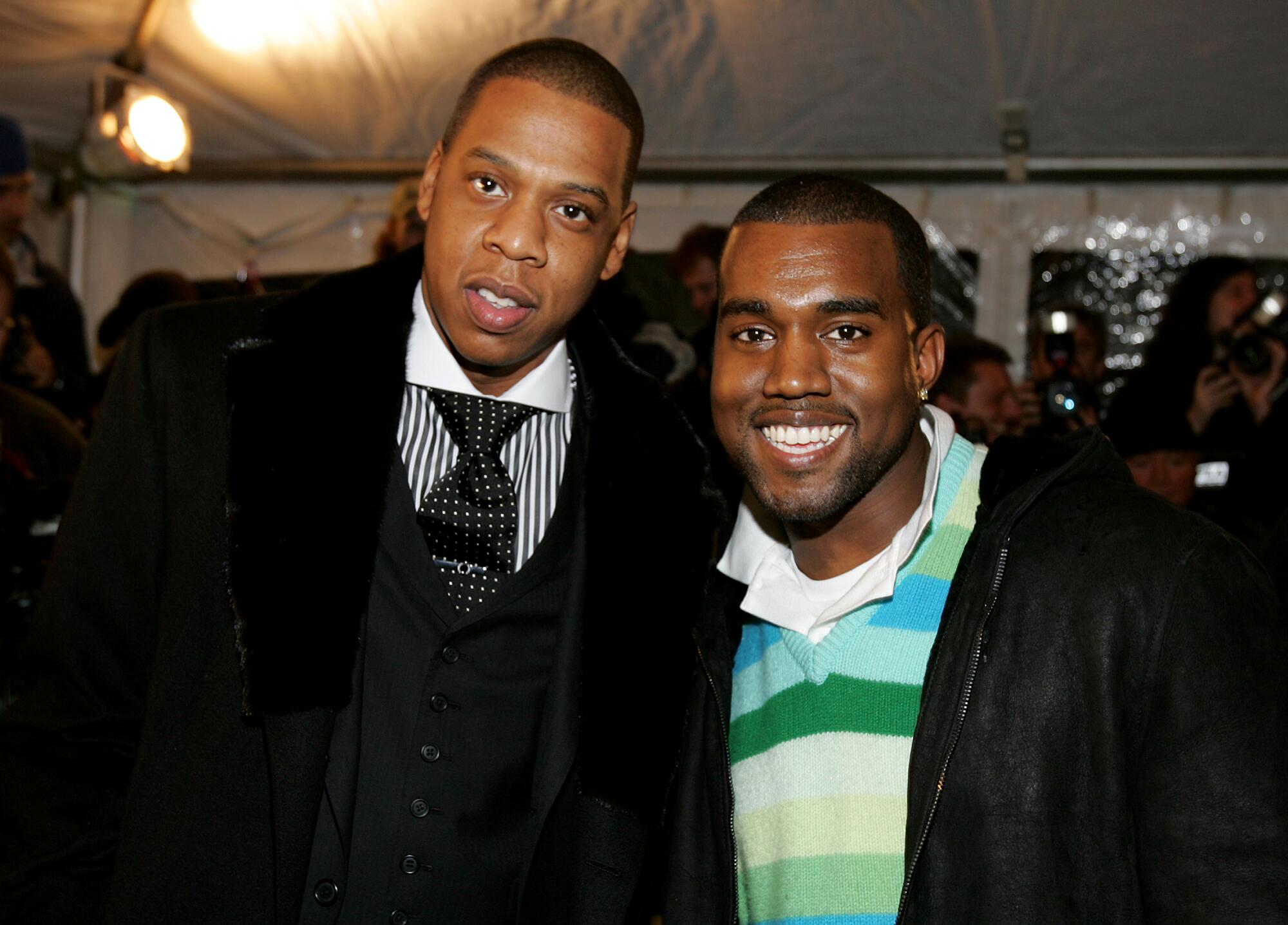
His collaborators span from Paul McCartney and U2 to Katy Perry and Rihanna to inheritors of his vision like Travis Scott. Rolling Stone deemed 2010’s “My Beautiful Dark Twisted Fantasy” the 17th best LP of all time, in any genre. As a label founder with G.O.O.D. Music, he helped steer John Legend, Kid Cudi and Pusha T to chart success and critical acclaim. He collaborated with visual artists like James Turrell, Vanessa Beecroft and Takashi Murakami.
His career as a fashion mogul arguably transcended even his music. With good-humored humility as an intern for Fendi, he developed an eye for cult-ish drapes, muted tones and sci-fi silhouettes. His collaborations with Nike and Adidas (alongside friends and muses like Virgil Abloh and Demna) sold billions’ worth of sneakers and streetwear, earning him credibility on elite European runways.
But mental illness, unchecked narcissism and a corrosive, conspiracy-fueled far-right belief system threaten to negate a lifetime of illustrious accomplishments.
When Ye released ‘Donda 2,’ you could only hear it through a device called the Stem Player. Its creator, Alex Klein, speaks out on the end of their partnership.
Born in Atlanta but a son of Chicago, West came from different circumstances than the hardscrabble Marcy Houses depicted on Jay-Z albums like “The Blueprint,” a breakout album for West as a producer. His father was a photojournalist and former Black Panther, while his mother, Donda (the namesake of his creative agency, his failed private Christian school and several albums), was an English professor at Chicago State University.
Dr. Carol Baker, who taught West science during high school, remembered Donda West as a guiding figure for her son.
“She was determined that he was not going to fall into the wrong hands,” Baker said. “We knew if his mom was coming in for parent-teacher conferences, and you had to tell Mom he didn’t have all his assignments in, she was coming down on him. We’d sit with him to get his work turned in because we knew he was a good kid and his mom wouldn’t let it go.”
Outside the classroom, Baker saw West fight hard to protect his friends. At times, his defensive spirit went too far.
“There would be times that fierceness and protective mentality would come out, even when it wasn’t needed,” Baker said. “As a teacher, you’d say, ‘Everything’s going to be OK, this person is fine, you don’t need to rile up an army to fight this fight.’ I still see that in the way he does things today. He was just as passionate as a child.”
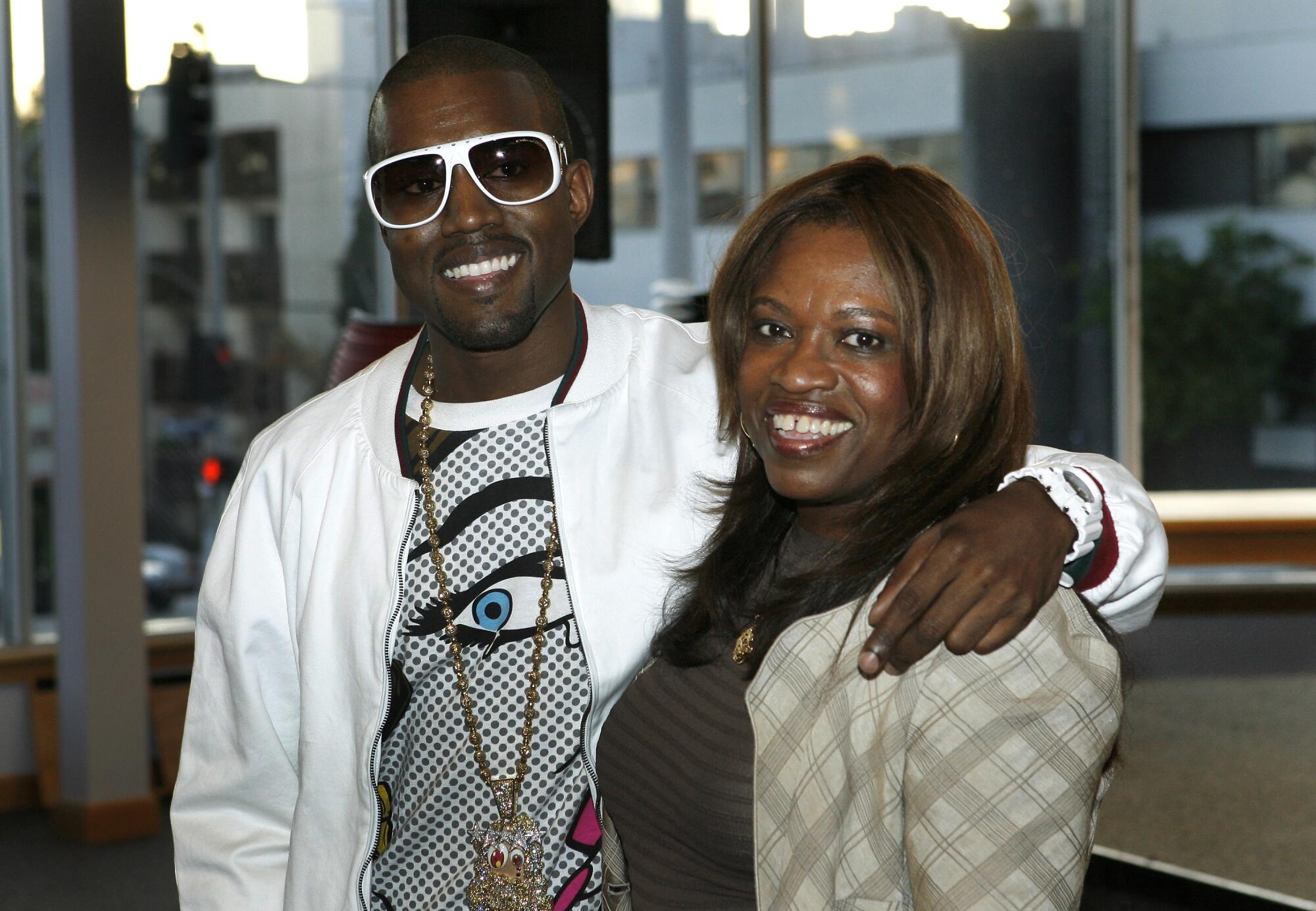
While West initially struggled to be taken seriously as a rapper, his solo breakthrough came after a brutal car wreck that required his jaw to be wired shut. The impervious confidence of his song “Through the Wire” and his debut, “The College Dropout,” propelled him to 10 Grammy nominations in 2005.
When he castigated President George W. Bush’s failed response to 2005’s Hurricane Katrina on live TV — “George Bush doesn’t care about Black people” — many Americans saw a brave rapper taking on the government and standing up for the Black community.
“In that moment after Katrina, his lack of social graces made him an important figure speaking truth to power,” Wasow said.
West recorded a bestselling, orchestra-driven album, “Late Registration,” with indie producer Jon Brion. West’s next LP, “Graduation,” won a 2007 sales war with 50 Cent, seen as a victory for ambitious, heartfelt hip-hop.
Yet the sudden, tragic death of his mother in 2007, after complications from cosmetic surgery, shattered his world. He seemed to blame himself for it — “When I moved to L.A., she moved to L.A. And she wound up in a place that would eat her alive,” he wrote in XXL after her death. “If I had lived in New York, she’d still be here.”
He rapped about his feelings on 2008’s “Pinocchio Story,” from the bleak and groundbreaking LP “808s & Heartbreak”: “The only one was behind me / I can’t find her no more, I can’t call her no more … The day I moved to L.A., maybe that was all my fault.”
“A single mom with a single child, they had each other’s backs no matter what,” Baker said. “That’s a little bit of where that fierce protectiveness comes from. When I found out that Donda died, my first reaction was, will he be OK?”
His boastfulness and hair-trigger temper enlivened awards shows and earned a “South Park” parody. In 2009, he rushed the stage at the MTV Video Music Awards to vent frustration over Taylor Swift beating Beyoncé for best female video. It blew up a planned tour with Lady Gaga and led Obama to insult him on that hot-mic recording. From a fellow Chicago legend, it hurt. “You know I’m your favorite,” West said afterward. “Just tell me you love me. And tell the world you love me. Don’t tell the world I’m a jackass, I’m fighting hard enough.”

West made some of his finest music in the next years, including 2010’s “My Beautiful Dark Twisted Fantasy” and 2013’s “Yeezus,” and in 2014 married Kardashian in a fame-merging event for the ages. Yet signs of creeping antisemitism began to emerge. West said in a 2013 radio interview that “Black people don’t have the same level of connections as Jewish people. … We ain’t Jewish. We don’t get family that got money like that.” He responded to criticism by saying, “I thought I was giving a compliment. … I don’t know how being told you have money is an insult.”
Fans began to question his beliefs, and even his stability, in 2016. He wrote on Twitter that “BILL COSBY INNOCENT !!!!!!!!!!” and depicted him and Trump nude in bed in the video for “Famous.” He declared onstage at a California concert that, while he didn’t vote, he “would have voted for Trump.” He underlined the point by meeting with Trump in New York, claiming, “I feel it is important to have a direct line of communication with our future President if we truly want change.”
That November, after Kardashian was bound and robbed in a Paris hotel room, West’s paranoia spun out further. Onstage at a concert, he said, “Jay-Z, call me, bruh. You still ain’t called me. ... Jay-Z, I know you got killers. Please don’t send them at my head. Just call me. Talk to me like a man.” He ended the show early and canceled his remaining tour. Just hours later, after police responded to a welfare check call at his trainer’s home, West entered treatment at UCLA Medical Center for a “psychiatric emergency,” according to the Los Angeles Fire Department dispatch call.
Some pastors and members of the Christian community have been hesitant to publicly admonish him. Others feel compelled to speak out.
The next year, West decamped to Wyoming, where he produced records with Pusha T, Kid Cudi, Teyana Taylor and Nas. He acknowledged his bipolar disorder on the album cover for 2018’s “Ye” but flirted with far-right conspiracies bound up with his religiosity.
“I love the way Candace Owens thinks,” he said, praising the Black right-wing media firebrand, and added in a TMZ interview, “When you hear about slavery for 400 years … That sounds like a choice. You were there for 400 years and it’s all of y’all. It’s like we’re mentally imprisoned.”
He posted photos of himself wearing a MAGA hat, to the dismay of fans and friends like John Legend, who wrote in a text message: “I hope you’ll reconsider aligning yourself with Trump. You’re way too powerful and influential to endorse who he is and what he stands for. ... Don’t let this be part of your legacy. You’re the greatest artist of our generation.”
West wrote back, “I love you John and I appreciate your thoughts. You bringing up my legacy is a tactic based on fear used to manipulate my free thought,” and posted screenshots of their exchange to social media. In October 2018, West visited Trump in the White House, taking photos in MAGA gear, to the glee of far-right voters.
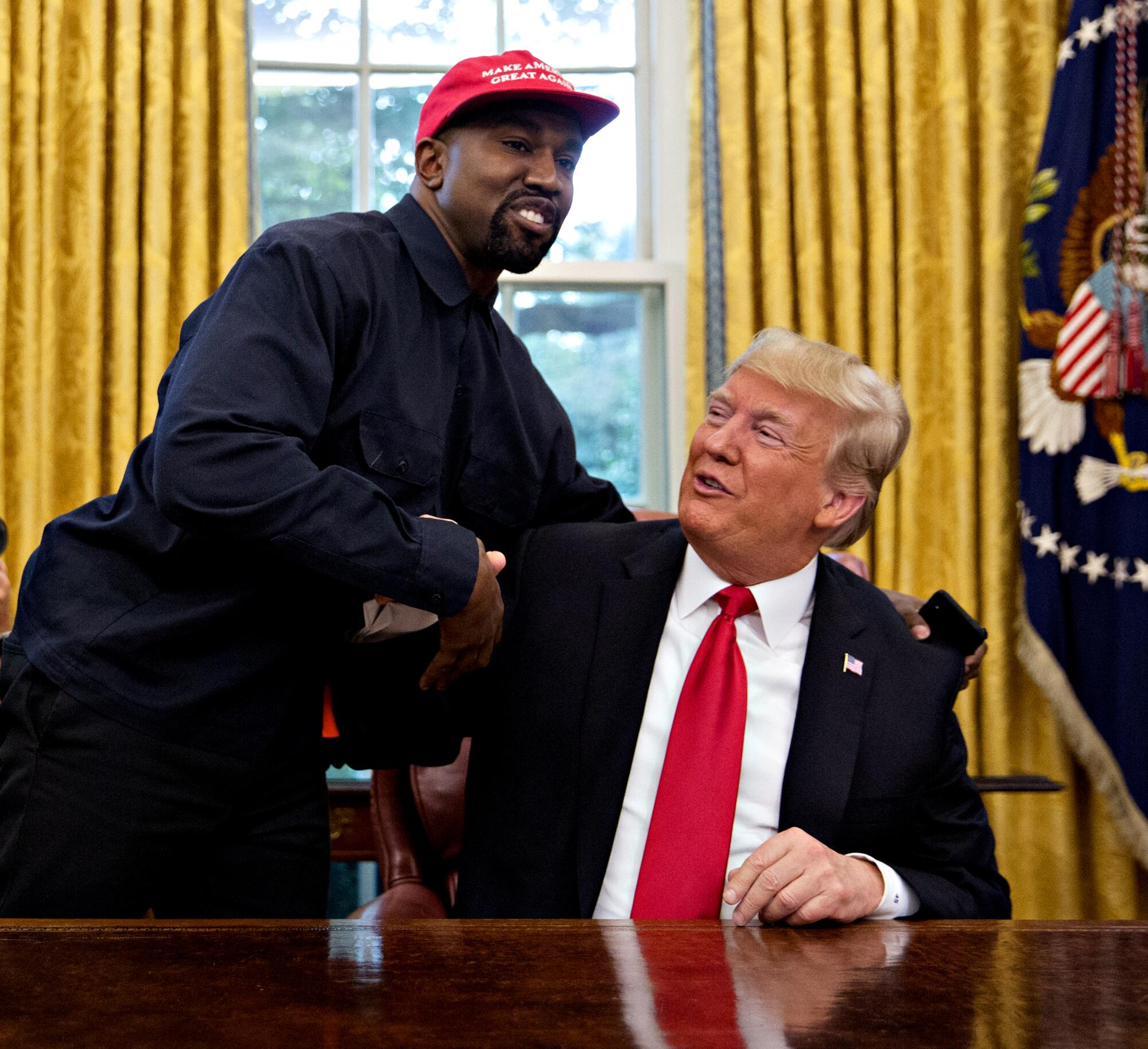
Wasow recalled meeting West while moderating a panel with him shortly after the release of “My Beautiful Dark Twisted Fantasy.” He believes that, while some of West’s tics and beliefs are idiosyncratic, “he’s a wealthy celebrity who is now unmoored from the Black community, and caught up in a fundamentally American conspiracy culture. There are now pathways for someone like him into what historically were white supremacist movements.”
Many figures in that subculture are open racists, but Wasow has seen an “uncoupling of classic white supremacy ideas, that who is on top or subordinate was clearly defined by race. Now it’s more amorphous, where Enrique Tarrio, a brown Cuban American, can be the head of the Proud Boys. The coalition that’s forming here is decreasingly defined by race and more by a set of ideas like an aggressively patriarchal, chauvinist and Christian nationalist vision of the world.”
In September 2018, the creative director Ryder Ripps was at Kanye West’s Calabasas office. The 36-year-old had run West’s creative agency, Donda, for just a few months, after creating a website for fashion designer Virgil Abloh. His portfolio ran from album art to a White House presentation for then-President Trump.
“I was really excited,” Ripps told The Times, “because there was so much about him that I respect.”
On that day, Ripps recalled, West asked him a startling question: “Do you think it’s a problem that I am interested in the Nazis and Hitler?”
“I remember being weirded out by it,” Ripps said. He added that West knew he was Jewish and did not make overtly antisemitic comments to him then. But after West’s recent descent into antisemitic conspiracies and MAGA-drenched reactionary politics, Ripps now thinks that question was a warning.
“It’s not a problem to be interested in history,” Ripps said. “It’s a problem to be antisemitic and hateful.”
After walking away from negotiations to headline Coachella in 2019, West pivoted to the religious music he’d explored with his church-revival Sunday Service concerts. In interviews, he decried abortion rights and advocated for religion in the public sphere: “Who told you that my career would be over?” he told L.A.’s Real 92.3 FM. “The same people who are telling you that you can’t have a right to say who you would vote for, those same people will take Jesus out of school.”
He then mounted an ill-fated 2020 presidential run, where he earned a fraction of a percentage of the vote in a handful of states. Operatives with his campaign were linked to right-wing megadonors and efforts to contest the vote count in Georgia.
With the announcement of a series of “listening parties” in stadiums across America, fans hoped his new album, “Donda,” would be a return to form and normalcy. While the first show went smoothly, subsequent shows were marred by antagonistic guest appearances from Marilyn Manson (accused of sexual and physical abuse) and DaBaby (who made homophobic statements onstage). An amicable December 2021 reconciliation show with frenemy Drake at the L.A. Coliseum sold out though, and fans believed that West might still be able to recover his standing.
Randy Phillips, the former chief executive of concert promoter AEG Live, promoted the Coliseum show. He told The Times in a text message, “The Ye I worked with when I promoted and produced the Free Larry Hoover Benefit, co-starring Drake, at the Los Angeles Memorial Coliseum and the Donda2 concert at Loan Depot Park Stadium in Miami, never expressed opinions or took positions like White Lives Matter or antisemitism, since I make no secret of being Jewish. I found him to be both brilliant and opinionated, like many geniuses.”
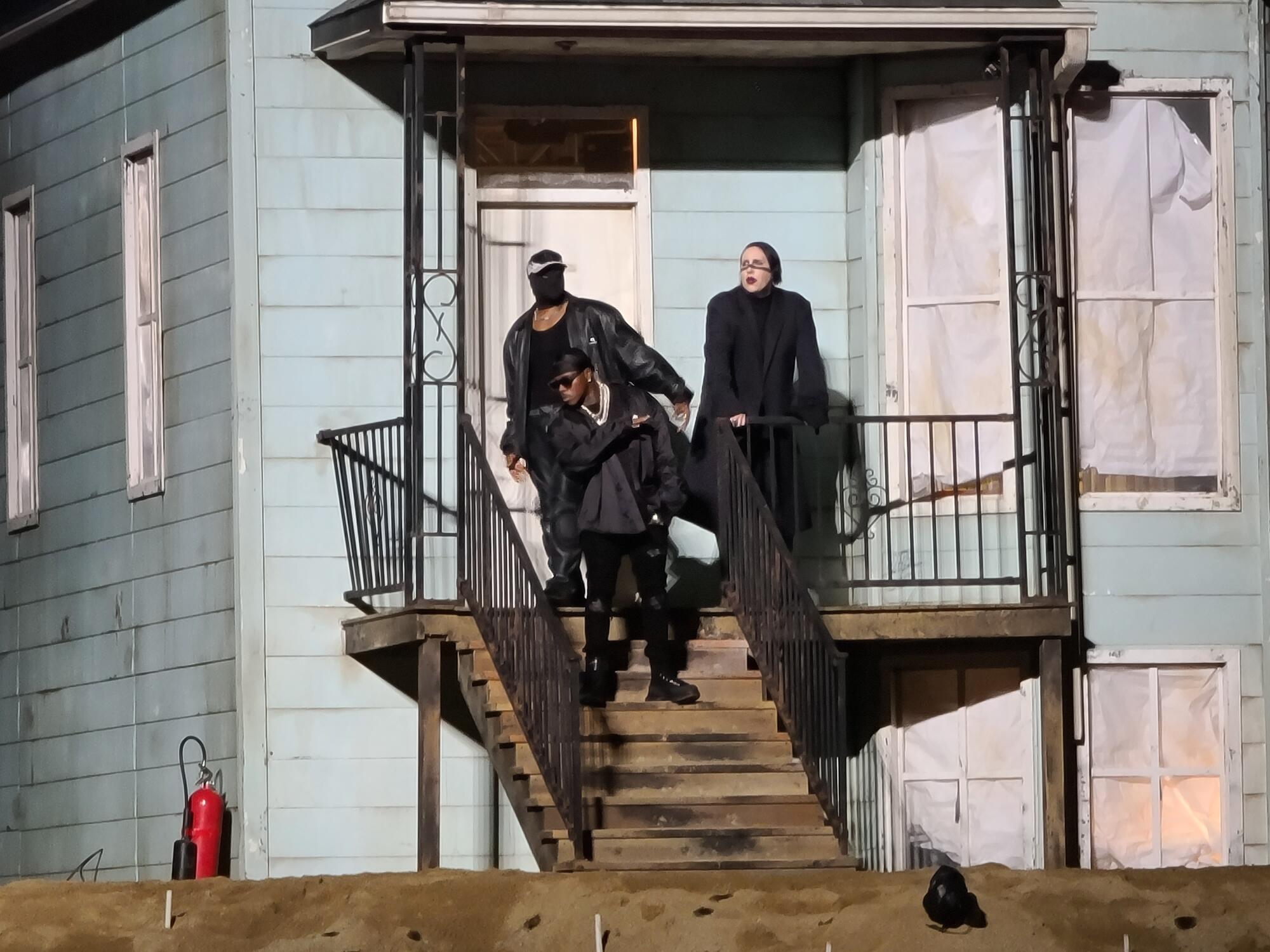
In early 2022, West backslid again with last-minute cancellations of festival headline gigs at Coachella and Rolling Loud Miami, to the frustration of fans and promoters. His divorce from Kardashian followed her claims of harassment and “creating a dangerous and scary environment” for her and their four children.
In October, West speculated that Jews were masterminding the career of rapper Diddy, leading social media firms to lock his accounts. After Elon Musk purchased Twitter, West returned to the social media platform to make his infamous “death con 3” post and continued the rapid descent that led his partners to disavow him. West responded by announcing that he would purchase the right-wing social media site Parler at the urging of Owens. (On Thursday, Parler announced that the deal was off.)
Some in West’s camp who spoke to The Times said they’d stayed quiet about their experiences because of nondisclosure agreements, or because they hoped West wasn’t serious about his conspiracy theorizing. CNN reported on a settlement between West and a business executive who worked for him that was reached in part because the rapper’s alleged obsession with Hitler created a hostile work environment. TMZ’s Van Lathan Jr. said in a podcast that West professed his “love” for Hitler during his 2018 TMZ interview, and the comments were edited out. NBC reported a settlement to a former employee who alleged that the rapper used antisemitic language in the workplace. Rolling Stone reported that West subjected employees to watching pornography at work meetings.
West gave vitriolic, erratic and antisemitic interviews on Tucker Carlson’s Fox News show, but Carlson edited out the worst comments, such as , “When I say Jew, I mean the 12 lost tribes of Judah, the blood of Christ, who the people known as the race Black really are,” which later leaked.
Ripps, the creative director, said West had intended to name “Ye,” his 2018 album, “Hitler.” Ripps now believes that West’s antisemitism is long-standing and that people should “understand that his tirades are within a framework of Nazi propaganda. They’re not merely said at a whim.”
Those beliefs alienated longtime friends and collaborators like rapper Pusha T, who worked with West on his own 2022 album, “It’s Almost Dry.” Pusha T told The Times that West’s antisemitic comments “definitely affected me. As a Black man in America, there is no room for bigotry or hate speech. So yeah. It’s been very disappointing, let’s talk straight.”
West nonetheless hunkered down.
“I lost my f— family. I lost my kids. I lost my best friend in fashion. I lost the Black community,” he told podcaster Lex Fridman in a combative, rambling interview. “People said I lost my mind. ... I lost my reputation.”
West since concluded his contract with his record label, Def Jam, and lost his talent agency, CAA, as well as his fashion deals with Adidas, Gap and Balenciaga.
Phillips, the former AEG executive, said, “The only way forward for me to work with him again, if Ye so desired, would have to be a complete renunciation of those positions and the passage of time for reflection on this unfortunate period in his career and life. Words have power when spoken by someone so influential, whose own body of work speaks for itself.”
The “Donda” album debuted atop the Billboard 200, and despite his pariah status, West ended 2022 as the fourth-most-streamed artist on Spotify in the U.S. Still, it’s unclear who, if anyone, will help him release new music. The industry, from labels to streamers to talent bookers to fellow artists, is unlikely to support him as he brazenly associates with neo-Nazis and white supremacists.
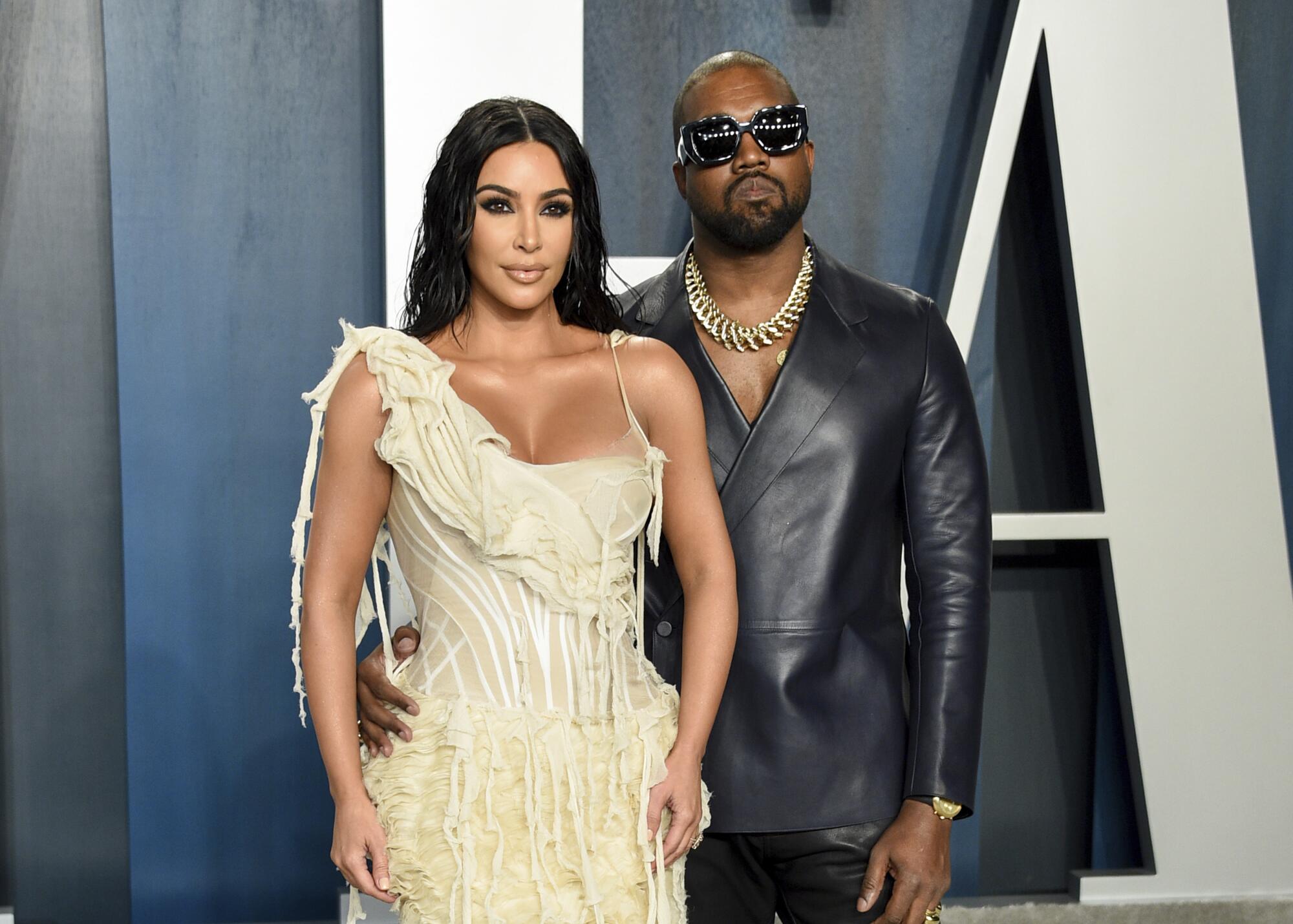
West’s net worth, once estimated at close to $2 billion, has collapsed. His divorce from Kardashian was finalized in late November. West will owe her $200,000 a month in child support and security expenses for their children.
After the Mar-a-Lago dinner, even Trump called the rapper “a seriously troubled man ... who had been decimated in his business and virtually everything else.”
After posting a combination of a Star of David and a swastika, West was again suspended from Twitter on Thursday.
Wasow said West could possibly come back from his current abyss, in time. Forgiveness is a major theme in the gospel music West loves. However, “that would require a level of contrition that’s not evident in him,” he said. “If he got the help he needs and made amends, there’s still enormous regard for him as an artist. He had moments of being an important voice for black advocacy. America loves a comeback story, but that would require him having a presence of mind to see the wrong he’s done.”
A top entertainment publicist who has represented high-profile music clients for 40 years and requested anonymity to speak freely, said, “The first step in the process is that he has to listen to somebody. Then he has to completely disappear for six months. After he proves he’s sincere about wanting to change his ways, then he can start doing apology interviews.”
The publicist noted that West “hasn’t committed any crimes, and America is a very forgiving country. But he has to want forgiveness.”
Another crisis communications executive who likewise requested anonymity said that while “anything is possible,” so far West has “only doubled down, he didn’t apologize. After Michael Richards used the N-word, he apologized. I don’t know how Kanye could come back, or to what audience. Maybe there could be a remarkable transformation, but barring that, I know I wouldn’t represent a racist.”
When asked to speculate about any possible path to redemption, Howard Bragman, a veteran crisis PR executive, told The Times in an email, “He’s not worth my time.”
On Thursday, West and Fuentes appeared on “InfoWars,” the far-right conspiracy show hosted by Alex Jones, who owes hundreds of millions in damages to the families of the Sandy Hook shooting victims.
Wearing a full-face balaclava, West said, “I see good things about Hitler also ... this guy that invented highways, invented the very microphone that I use as a musician, you can’t say out loud that this person ever did anything good.”
Jones tried to backpedal, saying he didn’t approve of Nazis. West got in one last comment before Jones cut to a commercial break.
“I like Hitler,” West said.
Times’staff writers Kenan Draughorne and Anousha Sakoui contributed to this report.
More to Read
The biggest entertainment stories
Get our big stories about Hollywood, film, television, music, arts, culture and more right in your inbox as soon as they publish.
You may occasionally receive promotional content from the Los Angeles Times.
